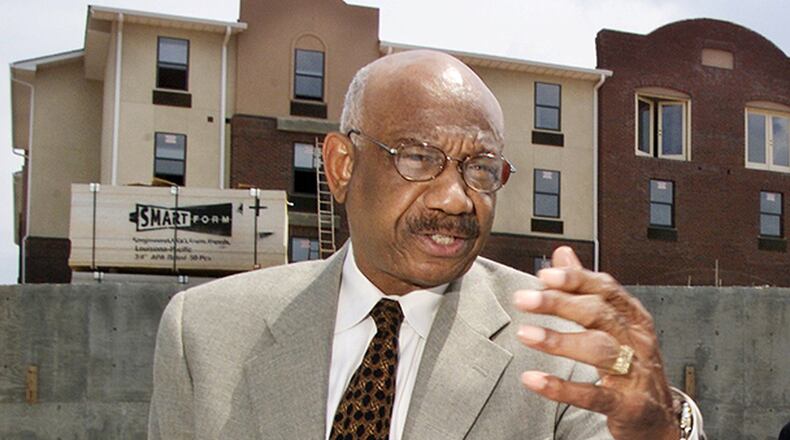Herman Jerome “H.J.” Russell expected the best from people.
It’s no small wonder because Russell demanded the best of himself.
Russell sat at the helm of one of the nation’s leading African American-owned construction, real estate and concessions empires, leaving his footprint on landmark projects in Atlanta and throughout the nation.
His legacy, though, doesn’t stop there.
Russell was also a prominent philanthropist and a key behind-the-scenes figure during the civil rights movement, who provided bail money and other financial support to leaders like the Rev. Martin Luther King Jr. when they were arrested during protests and sit-ins.
His story is being told now in a documentary, “Building Atlanta: The Story of Herman J. Russell.”
The 54-minute documentary is a collaboration between the Russell family and father-and-son filmmakers David and John Duke.
The project came about through discussions within the family about recognizing the patriarch’s legacy and making sure that future generations know of his contributions.
Russell died in 2014 at age 83.
“We wanted to tell his story and what he meant to Atlanta and to many people around the nation,” said Michael B. Russell, his son and CEO of H.J. Russell & Company. The Russell Companies, which includes H.J. Russell & Company and Concessions International, has $200 million in annual revenue and more than 2,500 employees nationwide.
The documentary includes appearances by former Atlanta Mayor Shirley Franklin and businessmen C. David Moody Jr. of C.D. Moody Construction Co. and Egbert L.J. Perry, who is CEO of the development firm Integral Group and former chairman of home mortgage giant Fannie Mae.
Russell’s orbit included presidents, congressmen, mayors, civil rights leaders and Fortune 500 business executives.
“A lot of young African Americans who went to work for him are now very, very successful on their own,” said David Duke. “They called it the Herman Russell University. He empowered a whole new generation. He was a character and knew exactly who he was. The white business community respected him and his work. He helped to make Atlanta the city too busy to hate.”
Nothing in the documentary surprised him, said Michael Russell, 55. Instead, “it was a reinforcement of the man that I knew. I had a chance to see him in many interactions in various environments. I saw how he operated and how he was able to be successful and overcome obstacles.”
Russell and his siblings, H. Jerome Russell and Donata Russell Ross, work in the businesses today and have for years.
Russell said his father expected his children to carry their weight.
They always had summer jobs and and worked in the family business during school breaks all the way through college.
"He was clearly from that generation," he said, laughing. "Everybody had to carry their own weight. We all learned the value of hard work. They used to say back then that money doesn't grow on trees."
Russell grew up the youngest of eight children during the Great Depression. His father had his own plastering business and his mother washed clothes for people and took care of the household.
While it was particularly hard for African Americans in the segregated South, Russell nurtured dreams of being an entrepreneur. A degree from Tuskegee Institute, now Tuskegee University, helped with that plan.
At 12, he was walked to City Hall to get a permit to open a shoeshine business. An alderman called him a derogatory name and sent him on his way.
Russell opened a shoeshine business, selling candy, Coke and shoestrings, anyway. At age 16, he bought his first piece of land in Summerhill. He started his business doing plastering work. Later, he would do construction on landmarks like the Georgia-Pacific headquarters, the Georgia Dome and the Equitable Building.
In 2006, the business leader was one of the first Atlantans to contribute $1 million for the acquisition of King’s papers.
Yet, he always made time for family, said Michael Russell.
Michael Russell was a high school athlete. His dad managed to make most games. When he wasn’t working, he would be home grilling steaks or hanging out with family and friends.
“I certainly saw the business side of him and how he got things done,” said Michael Russell. “He made sure that people did what they said they were going to do. He was very determined and focused on results. He had a way of kicking you in the butt and patting you on the back in the same meeting and you felt good about it. That’s a real skill.”
TV PREVIEW
“Building Atlanta: The Story of Herman J. Russell”
Airs in Atlanta on ATL PBA, Channel 30 at 9 p.m. Sunday and 7 p.m. Feb. 23. The 54-minute documentary is a collaboration between the Russell family and father-and-son filmmakers David and John Duke.
About the Author
Keep Reading
The Latest
Featured



